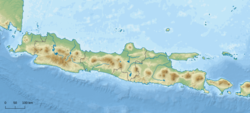
Back زلزال جاوا 2006 Arabic Zemětřesení na Jávě (květen 2006) Czech Jordskælvet på Java 2006 Danish Java (Insel)#Geologie German Terremoto de Java de mayo de 2006 Spanish 2006ko Yogyakartako lurrikara Basque زمینلرزه ۲۰۰۶ جاوه Persian Jaavan maanjäristys 2006 Finnish Séisme de mai 2006 à Java French Gempa bumi Yogyakarta 2006 ID
 | |
| UTC time | 2006-05-26 22:53:58 |
|---|---|
| ISC event | 8358516 |
| USGS-ANSS | ComCat |
| Local date | 27 May 2006 |
| Local time | 05:53 WIB (Indonesia Western Standard Time) |
| Magnitude | 6.4 Mw[1] |
| Depth | 15 km (9 mi)[1] |
| Epicenter | 7°57′40″S 110°26′46″E / 7.961°S 110.446°E Bantul Regency[2] |
| Type | Strike-slip |
| Areas affected | Yogyakarta Special Region Java, Indonesia |
| Total damage | Extreme[3] |
| Max. intensity | MSK-64 VIII (Damaging)[4] MMI IX (Violent)[5] |
| Peak acceleration | 0.336 g[6] |
| Casualties | 5,749–5,778 dead[7] 38,568–137,883 injured[7] 600,000–699,295 displaced[7] |
The 2006 Yogyakarta earthquake (also known as the Bantul earthquake) occurred at 05:53 local time on 27 May with a moment magnitude of 6.4 and a maximum MSK intensity of VIII (Damaging) in the Yogyakarta region of Java, Indonesia.
Several factors led to a disproportionate amount of damage and number of casualties for the size of the shock, with more than 5,700 dead, tens of thousands injured, and financial losses of Rp 29.1 trillion ($3.1 billion). With limited effects to public infrastructure and lifelines, housing and private businesses bore the majority of damage (the 9th-century Prambanan Hindu temple compound was also affected), and the United States' National Geophysical Data Center classified the total damage from the event as extreme. Although Indonesia experiences very large thrust earthquakes offshore at the Sunda Trench, this was a large strike-slip event that occurred on the southern coast of Java near the city of Yogyakarta. Mount Merapi lies nearby, and during its many previous historical eruptions, large volume lahars and volcanic debris flowed down its slopes where settlements were later built. This unconsolidated material from the stratovolcano amplified the intensity of the shaking and created the conditions for soil liquefaction to occur. Inadequate construction techniques and poor quality materials contributed to major failures with unreinforced masonry buildings (then the most prevalent type of home construction), though other styles fared better.
- ^ a b Cite error: The named reference
ISC-GEMwas invoked but never defined (see the help page). - ^ "Lokasi Prasasti Episentrum Gempa Bantul". kusnantokarasan.com. Archived from the original on 2024-09-06. Retrieved 2024-01-12.
- ^ Cite error: The named reference
NGDCwas invoked but never defined (see the help page). - ^ Cite error: The named reference
Murakamiwas invoked but never defined (see the help page). - ^ "M 6.4 – 10 km E of Pundong, Indonesia". 27 May 2006. Archived from the original on 14 February 2023. Retrieved 2 August 2021.
- ^ Elnashai et al. 2006, p. 18
- ^ a b c Cite error: The named reference
PAGER-CATwas invoked but never defined (see the help page).
